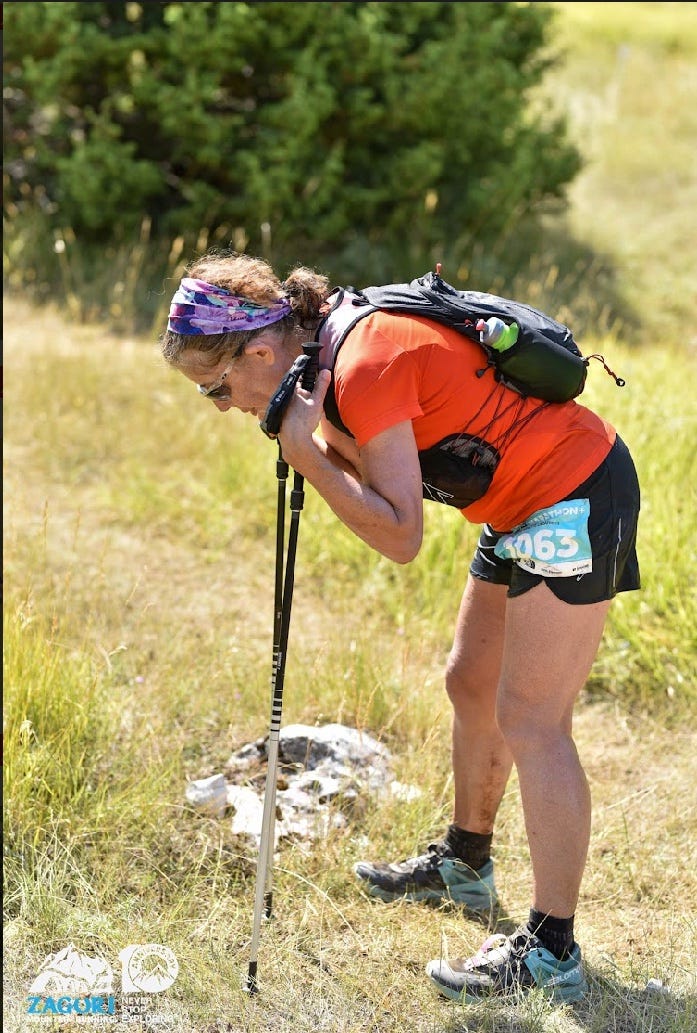Choking, the Yips, and Writer's Block
Or, how partial success can get you where you want to go
Let’s talk about that nasty thing no athlete wants to really think about. Choking. It seems as though it has to be bad luck (like calling Macbeth by any name other than “the Scottish play”) to even type the word. It seems like maybe an athlete could even get the yips simply by admitting they are a real thing. Or that a writer might come down with writer’s block simply by acknowledging its looming possibility. But let’s go ahead and talk about it. Choking. Writer’s block.
I don’t think I’ve ever choked in a race or other athletic event. And I’ve never really had writer’s block. My take on writer’s block is, in fact, that I don’t think it exists. Even if you might not be writing well, you can always write something. Surgeons don’t ever have surgeon’s block, that I know of. Bus drivers don’t have bus driver’s block. It is always possible to Do the Thing. Drive the bus, sew up the incision. Write the book or the essay or the newsletter (even if, as with this one now, you might be finding that the thoughts aren’t holding together as you’d hoped).
But there is a difference between writer’s block and choking. There’s even a difference between choking and the yips, the yips being that affliction of golfers and baseball players in which they lose the ability to perform the simple mechanics of their sport. While the yips are chronic, choking is specific to an event. Choking happens when you’re in a position to succeed—and you manage not to. Sports psychologists have covered this far better than I ever could, but suffice to say that we know these troubles all come from some similar place in the brain, some place of anticipation and excitement and expectation and, ultimately, fear. Because we know we can achieve something, it suddenly seems almost too easy, and our preparation seems suddenly suspect. Could I really be ready? Haven’t I forgotten something? Or, because we know we have a certain mastery over our sport (or our prose), we realize how valuable it is—and as soon as its value to us is known, we fear losing it. And it’s very, very hard to achieve something when you are afraid.
Last month, I ran a race in the mountains that was the longest I’ve ever run in my life: 27 miles, with 8,500 feet of elevation gain. But to say I ran would be a misnomer. As I documented ad nauseam, I ended up having to walk or fast-hike most of the distance, thanks to a tight calf muscle I’d been nagged by in the weeks leading up to the race. But two days after the race, I was able to hike and to run downhill without calf pain. And two more days after that, and two more after that, I went on trail runs that were lovely and pain-free. I was mystified. How could I have been unable to really run on July 24th but able to enjoy a handful of six-milers in the mountains just days later? That’s when it hit me: maybe I had choked.
When you’re out on a mountain trail for a total of ten hours, if you’re choking, it’s going to unfold slowly. You’re not the basketball player who flubs a free throw, or the skilled rower who catches a crab (no, this is not about fishing) in the middle of a sprint. No, you’re the runner who, perhaps out of nerves or some strange psychosomatic depositing of worry into a part of your body, makes a series of decisions that don’t even feel like decisions at the time but that gradually eat away at your chances of complete success. (I say “complete” success for a reason. We’ll come back to this.) I look back on the race now and I see some moments when I thought about doing something and then didn’t do it. Should I put my hiking poles away? Should I drink more? Should I eat that pasta at the aid station? Each time, I considered these options and then said, Nah. A friend recently told me that the sign that you are bonking (no, not that bonking) is that you ask yourself if you should eat—and you don’t eat. Bonking isn’t quite the same as choking, but it seems to me that there is a kind of choking that leads you to make bad decisions (or non-decisions) about taking care of yourself. And then you bonk.
So. Did I choke? Maybe. I wanted to do this race so badly that I got teary at the start line. An experienced hiker and marathoner, I’d still never done a race like this: basically hiking a marathon at speed. It meant a lot to me. And somehow, possibly, I got my sense of value all tangled up on the day. The race meant so much to me that a part of my brain decided I had already accomplished my goal just by being there. Doing any more work than that—than simply getting to the end—would be to try (weirdly) too hard, to acknowledge how much I cared about the whole thing. There is a way in which you can brace to accept the possibility of failure (we’ll come back to that) by doing things that ensure you won’t succeed. In other words, quite possibly I told myself (in some silent, reptile-brain way) that it would be ok if I didn’t win my age group, or if I didn’t make the 8-hour goal I thought was possible, or if I had to walk on that tight calf. And then I didn’t take care of myself in the ways I could have. I didn’t win my age group and it was ok (and the only other woman in my age group blew me away with a time I never could have beaten). But I sort of choked: I accepted the possibility of failure and thus gave in to certain non-decisions that ensured it.
Before we go on, though, it has to be said that endurance events bring their own psychological challenges, and fatigue occurs in the brain too. So, if I made poor decisions, I did so in part because it was already too late to make the good ones. I was already too something—too thirsty, too hungry—to decide to get the food and drink that would have kept me on track.
So. Complete success. Bracing for failure. I warned you I’d come back to these ideas!
Choking is a sort of pre-emptive failure. We allow failure so we won’t have to acknowledge how much something means to us.
But if we break our notion of success into smaller pieces, then it can feel less threatening, less awe-inspiring. It can feel more manageable. We won’t have as much reason to come at it with the tool (and trap) of the choke. Complete success? Who can even define that, let alone achieve it, save that tiny percentage of human beings who are, say, Olympians or Booker Prize winners, individuals at the peaks of their abilities. But partial success, smaller success? Now, that’s manageable. That’s something you can set yourself up to achieve every day.
I’m a big believer in creating positive-feedback loops for ourselves. Whether we’re endeavoring as writers or athletes, or neither, or both, we need something to pump a fist about. We need to be able to tell ourselves, on a regular basis and with truth and accuracy, yup, nailed it. Partial successes make this possible. A month from now, I’m running another trail race, this time 30 miles for what will be my new longest run ever. I plan to work very hard to break that experience down into small successes. I want to create a positive-feedback loop for myself so a) I won’t choke and b) I’ll come away from the event with a sense of accomplishment. And if that works, I’ll carry that approach into my other endeavors, too.
If I’m willing to reject the whole concept of writer’s block, I can also commit to preparing not to choke. And here’s a goal I’ll put out here. I have this habit of panicking on schedule. Yes, when I arrive at a particular section of the Charles River Basin, especially in my rowing single but also in a more stable two-person shell, I panic. It’s become almost routine now. Oh, here we are near the Massachusetts Avenue bridge: commence panic!
What am I afraid of? That the boat will flip and I will go into the water (I can swim fine) and I will die. (I didn’t say this was rational.) The trouble is that this panic can actually create the conditions that will make it true, by causing me to shake and to thus row badly. I could catch a crab if I’m rowing like that. What to do. I have to train not to choke on schedule. I have to practice whatever positive-feedback loop I can so as to remember every partial success I achieve on that stretch of river. That will be my goal, my way to avoid the choke.
What will yours be?





I remain convinced that the Massachusetts Avenue bridge has some sort of specific wind and or water current around it that is unusual and thus feels weird and induces panic in those who are not used to it.
Your commitment to adventurous athletic-ing brings me vicarious joy. Oooof. And to write about it in a sane, thoughtful, writerly manner. That's a sport too, huh. This is really boring of me to mentions as it really has nothing to do with what you're writing about but I was in a band called The Yips https://www.youtube.com/watch?v=ax-i0B3VbSM I'd not known what they were but when someone told me I was like 'oh, that's the name of the band then' -- ha.